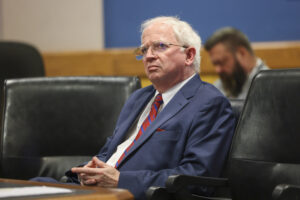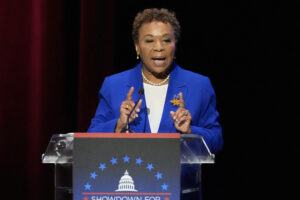Huntington Hospital Values Profits Over People
The deaths of 11 patients and the California Nurses Association’s battle to unionize nurses at the hospital in Pasadena, Calif, is emblematic of a larger problem—the corporatization of health care The deaths of 11 patients and the California Nurses Association’s battle to unionize nurses at the hospital in Pasadena, Calif. An investigation into patient deaths at Pasadena's Huntington Memorial Hospital found fault with both the design of medical scopes used in procedures and the hospital's lapses in infection control. (ABC7 video still)
1
2
3
An investigation into patient deaths at Pasadena's Huntington Memorial Hospital found fault with both the design of medical scopes used in procedures and the hospital's lapses in infection control. (ABC7 video still)
1
2
3
But there’s another important missing piece to the story about the tragic deaths of 11 Huntington patients. Huntington nurses warned hospital management about the problem with unsterilized scopes, but their concerns were ignored. It wasn’t until a Huntington nurse expressed concerns to CNA — which then, protecting the nurse’s identity, notified federal health agencies and the Los Angeles Times — that Huntington removed the scopes and began taking appropriate action. This is one reason that many Huntington nurses were organizing to gain a voice in their workplace. It had to do with patient care—specifically, the hospital administration’s prioritizing of revenue over patient care.
In 2014, Huntington nurses felt that they weren’t being listened to about this and many other aspects of patient care. So they contacted CNA and began talking about organizing a union. The nurses who called CNA felt that having a union, with a collective bargaining agreement insuring an independent voice for nurses in advocating for patients, was the only way that they would be listened to regarding the erosion of patient-care conditions, including chronic short staffing and inadequate supplies.
On paper, Huntington is a “nonprofit” institution, but in reality, it operates like a large for-profit corporation. Soon after the nurses’ union drive began in May 2014, the hospital (named for Henry E. Huntington, a turn-of-the-century railroad tycoon) engaged in a nasty and expensive union-busting effort. They paid a bevy of experienced and high-priced anti-union firms and consultants—Littler Mendelson, IRI and Genevieve Clavreul of Solutions Outside the Box—to harass nurses and undercut their organizing efforts. Managers at the hospital interrogated nurses about their union activity, required nurses to attend anti-union “captive audience” meetings and denied pro-union nurses access to the hospital when they were off-duty and wanted to discuss union matters.
When pro-union nurses and community allies, including a number of prominent local clergy, were meeting in the cafeteria, hospital security staff told them to remove their literature from the tables, but didn’t say anything to a group of anti-union staff at the other side of the cafeteria who had their own materials. One of the hospital’s security staff took photos of a pro-union nurse as she passed out leaflets on the public sidewalk outside the hospital. The hospital arbitrarily switched the retirement date of one nurse who had worked at Huntington for 31 years—and who was an outspoken union supporter—so she wouldn’t be able to vote in the union election last April.
Not all the nurses were initially sympathetic to the idea of unionizing. One of the reluctant nurses was Shin, who worked in the intensive care unit. Shin considered Huntington Hospital her second home. Her mother has worked there as a nurse for over 30 years. She was born at the hospital, attended its day care center and volunteered there when she was in high school. She worked as a nurse’s aide in Huntington’s ICU before becoming an RN. The family volunteers their dog at the hospital as a therapy dog.
“I was close with my mom’s coworkers. I loved Huntington,” Shin recalled. “I knew I wanted to go into nursing.”
Given her strong ties to the hospital, Shin was thrilled when she was hired at Huntington five years ago after graduating from the nursing program at California State University in Los Angeles. She worked hard, made close friends among her fellow nurses and enjoyed caring for her patients.
“I was outspoken about patient safety,” Shin said. “In nursing school, I learned that a lot of hospitals use lift teams to help patients turn over or get out of bed, so nurses don’t have to strain or hurt their backs. I gave my manager some research about this, but nothing happened. When we were short on linens or IV pumps, I mentioned it to my manager. But the problem continued. I thought the hospital was jeopardizing patient care, so I said something.”
Her words went unheard.
“To cut expenses, the hospital began rationing supplies, like bed linens and patient gowns,” Shin explained. “Many of our patients in the ICU have very compromised immune systems so the risk of infection is very high. It is absolutely essential that we have adequate supplies of clean linens, yet the hospital is intent on limiting these basic necessities.”
Nurses say that patient care standards at Huntington have eroded, compromised by cuts in nursing as well as support staff. Nurses have been forced to do more work with less help. They were made to do more admissions, more transportations of patients and more housekeeping tasks because of hospital cutbacks in these areas. The unsterilized scopes were among the many issues that nurses brought to Huntington management’s attention.
Thanks to CNA’s efforts, California is the only state in the country to enact a law mandating the ratio of nurses to patients in acute care facilities, which Huntington and other hospitals opposed before it was passed by the California Legislature and signed by Gov. Gray Davis in 1999. The law took effect in 2004, giving hospitals five years to phase in the changes. Nurses report that Huntington has repeatedly violated the nurse-to-patient ratio law, endangering patient safety.
Even so, when some of her colleagues contacted CNA to help them organize a union at Huntington, Shin had doubts.
“At first I wasn’t sure it was a good idea,” she said. “I went to some informational meetings. But I soon realized that we needed a collective voice to be advocates for ourselves and our patients. I’m not afraid to stand up for what I believe is right.”
Shin became a visible leader in the union drive. Before and after work, she met with fellow nurses—in their homes, coffee shops and outside the hospital—to encourage them to support the unionization effort. She was one of three Huntington nurses whose photo appeared on a CNA-sponsored ad on public buses running throughout the Pasadena area. “Save one life, you’re a hero,” the ad said. “Save a hundred lives, and you’re a nurse.”
Your support matters…
SUPPORT TRUTHDIG
Independent journalism is under threat and overshadowed by heavily funded mainstream media.
You can help level the playing field. Become a member.
Your tax-deductible contribution keeps us digging beneath the headlines to give you thought-provoking, investigative reporting and analysis that unearths what's really happening- without compromise.
Give today to support our courageous, independent journalists.






You need to be a supporter to comment.
There are currently no responses to this article.
Be the first to respond.